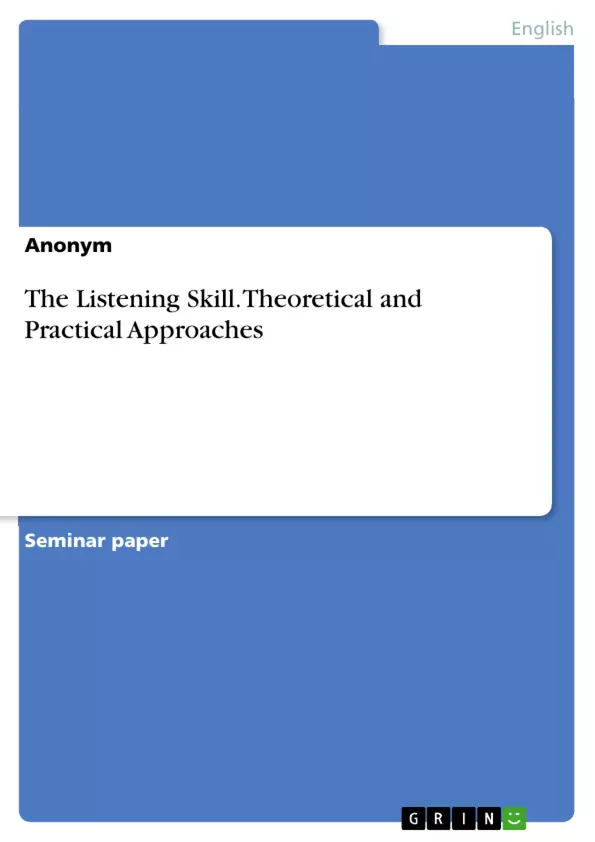Nowadays foreign language teaching has become established in the majority of primary schools. The introduction of foreign language teaching in primary schools leads to an improvement of linguistic and communicative competency. Due to the fact that pupils begin to learn English in grade one they automatically extend their learning time and they also start to learn the language in the most opportune moment in their life. Even shy pupils realize that they already know some English words, which they got to know from different kinds of advertising in radio, television or the internet. Another point is that it is possible to communicate in English without knowing much words or structures. As a result, the pupils’ motivation to learn the language retains.
As a teacher it is important to know which expectations you can have on your pupils and which accomplishments this young learners are able to achieve. Teachers should also be aware of the fact that children will always acquire new language input in a defined order. First they hear new input through listening. Then they attempt to repeat the new input through speaking. Through reading the children will see the written form of the new input and in the last step the children would write the new word themselves (cf. Clausen, 2009, p.8). So listening is a basic skill which is a foundation for any other skill like speaking, reading and writing.
According to that this term paper focuses on how to teach listening. Its main purpose is to provide information about theoretical and practical approaches, especially with emphasis on the listening skill in primary school. Moreover it gives an insight into appropriate behaviour of teachers and of different methods a teacher can use to improve children’s listening skills.
Inhaltsverzeichnis (Table of Contents)
- 1. Introduction.
- 2. Theoretical approach
- 2.1 The listening situation
- 2.2 The listening process
- 2.3 Extensive and intensive listening types
- 2.4 Listening strategies.
- 3. Practical approach
- 3.1 The Teacher – professional conduct
- 3.2 Learning goals at the end of fourth grade
- 3.3 Listening Activities in class
- 3.3.1 Prelistening activities.
- 3.3.2 (While-) listening activities.
- 3.3.3. Post-listening.
- 4. Conclusion.
- 5. References
Zielsetzung und Themenschwerpunkte (Objectives and Key Themes)
This term paper explores the teaching of listening skills in primary school, focusing on theoretical and practical approaches. Its goal is to provide insight into appropriate teacher behavior and effective methods for enhancing children's listening comprehension.
- The importance of listening as a foundational language skill
- Theoretical frameworks for understanding the listening process
- Different types of listening, including extensive and intensive listening
- Effective listening strategies for learners
- Practical activities for developing listening skills in the classroom
Zusammenfassung der Kapitel (Chapter Summaries)
The introduction highlights the growing importance of foreign language teaching in primary schools, emphasizing the benefits of early exposure to English. It emphasizes the role of listening as a fundamental skill for language acquisition.
The theoretical approach section delves into the nature of listening situations, exploring the complex interplay of linguistic and non-linguistic knowledge involved in listening comprehension. It examines the bottom-up and top-down processing strategies used by language learners. The chapter also discusses extensive and intensive listening types and the various strategies learners can employ to enhance their listening skills.
The practical approach section explores the role of the teacher in creating effective listening activities. It outlines learning goals for fourth-grade students and provides a framework for designing pre-listening, while-listening, and post-listening activities.
Schlüsselwörter (Keywords)
This term paper focuses on the key concepts of listening comprehension, language acquisition, primary school English teaching, teacher professional conduct, listening strategies, and classroom activities. It explores the theoretical underpinnings of listening and provides practical guidance for fostering effective listening skills in young learners.
Frequently Asked Questions
Why is listening considered a foundational skill in language learning?
Listening is the first step in the natural order of language acquisition (hear, repeat, read, write) and provides the basis for all other linguistic skills.
What is the difference between intensive and extensive listening?
Intensive listening focuses on detailed comprehension and specific information, while extensive listening aims at general understanding and overall meaning, often for pleasure.
What are bottom-up and top-down processing strategies?
Bottom-up processing involves decoding individual sounds and words, while top-down processing uses prior knowledge and context to predict and understand meaning.
What are pre-listening activities?
These are activities designed to prepare students for a listening task by activating prior knowledge, introducing vocabulary, or setting a purpose for listening.
What should be the learning goals for listening by the end of fourth grade?
Students should be able to understand simple classroom instructions, follow short stories, and extract key information from basic conversations in English.
- Citar trabajo
- Anonym (Autor), 2015, The Listening Skill. Theoretical and Practical Approaches, Múnich, GRIN Verlag, https://www.grin.com/document/300104



